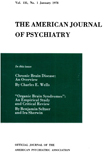Effects of peer review on outpatient psychotherapy: therapist and patient follow-up survey
Abstract
Interviews with 80 therapists and 50 patients at a community mental health center revealed that peer review effectively monitored the appropriateness of treatment and allocated limited treatment funds without unduly interfering with established treatment patterns, relationships, or outcomes. Most therapists reported receiving helpful consultation from the peer review committee, and the process encouraged them to focus more clearly on treatment goals. On the other hand, patients were concerned about the committee's role in making decisions about their treatment. Therapists noted as a problem the lack of certainty in establishing a treatment contract prior to peer review since the contract with the patient must remain fluid during the evaluation period. The therapists and patients demonstrated remarkable agreement in their assessment of treatment progress and whether further therapy was needed.
Access content
To read the fulltext, please use one of the options below to sign in or purchase access.- Personal login
- Institutional Login
- Sign in via OpenAthens
- Register for access
-
Please login/register if you wish to pair your device and check access availability.
Not a subscriber?
PsychiatryOnline subscription options offer access to the DSM-5 library, books, journals, CME, and patient resources. This all-in-one virtual library provides psychiatrists and mental health professionals with key resources for diagnosis, treatment, research, and professional development.
Need more help? PsychiatryOnline Customer Service may be reached by emailing [email protected] or by calling 800-368-5777 (in the U.S.) or 703-907-7322 (outside the U.S.).



